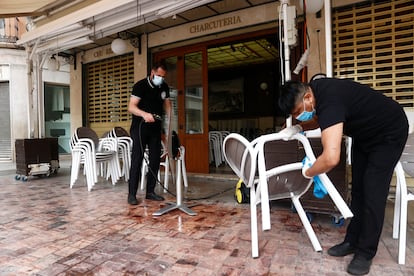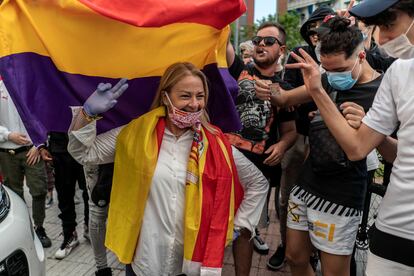Daily coronavirus deaths in Spain rise slightly for second day running, to 95
This is the fourth day in a row that the total number of fatalities came in at under 100. New infections also rose on yesterday’s figure, to 416
The number of daily coronavirus-related fatalities in Spain rose slightly for the second day running on Wednesday, coming in at 95, compared to 83 the day before. According to the figures released this afternoon by the Spanish Health Ministry, this is the fourth day that daily deaths linked to Covid-19 have come in under 100.
The region of Catalonia accounted for the highest number of the daily fatalities, with 40, which was 42% of the total.
Since the coronavirus crisis began in Spain, there have been a total of 27,888 official coronavirus-related deaths, and 232,555 confirmed infections.
In the last 24 hours, there were 416 new infections, up from the 295 registered on Tuesday. However, of these, only 172 people with the virus began to show symptoms during the last seven days. Speaking at the government’s daily coronavirus press conference, Fernando Simón, the director of the Health Ministry’s Coordination Center for Health Alerts, said that the other infections are likely older cases that have only just been confirmed.
Simón added that today’s data was “in line with what we have observed in previous days and does not contain any surprises.” He attributed the rises and falls in the statistics to the regions adjusting their reporting. He also explained that many more tests are now being carried out, and that the falls in new infections are happening at a faster rate than the majority of other countries that are in the deescalation phase.
Permits to be extended
The Spanish government has announced it will automatically extend residence, work and study permits if they were set to expire during the state of alarm or up to three months before its declaration. The measure, published Wednesday in the Official State Gazette (BOE), aims to address the legal uncertainty facing many migrants in Spain who have not been able to renew their papers as immigration offices remain closed due to the coronavirus lockdown.
The extension takes effect from the day after a permit is set to expire and will be valid for the following six months until the end of the state of alarm. The measure will also apply to migrants with voluntary work permits and the renewal of cards of family members of EU citizens.
Hospitality industry to lose nearly a million jobs
According to a new study, the hospitality sector in Spain will lose 900,000 direct and indirect jobs as a result of the coronavirus crisis, which has brought tourism to a standstill and forced the closure of bars and restaurants across the country.

The research by consultancy firm Foqus and Valencia University estimates that sales will fall between 45% and 55.7%. If the worst projection is confirmed, there could be as many as 1.1 million job losses. Although most of Spain has entered Phase 1 of the deescalation plan, meaning sidewalk cafes can reopen, the limits on capacity continue to hurt the bottom line of many businesses.
The study is based on two scenarios: one in which international tourism bounces back completely by October, and one in which the restrictions on travel continue. In the latter case, annual earnings could fall from €120 billion to $53 billion. This would lead to a loss of 676,000 direct jobs and 424,000 indirect positions.
According to the research, the highest number of jobs will be lost in the regions of Andalusia, the Canary Islands and Madrid. In percentage terms, the Canary Islands and the Balearic Islands will be hardest hit, with the regions losing 10.2% and 7% of the total jobs respectively.
Anti-fascists confront protesters
A group of anti-fascists on Tuesday confronted a crowd of protesters in the Madrid municipality of Alcorcón who were calling for the resignation of Prime Minister Pedro Sánchez. The two groups came together on the street, with anti-government protesters yelling “freedom,” while anti-fascists chanted “public healthcare” and “Alcorcón will be the tomb of fascism,” in reference to the rallying cry against Francisco Franco during the Spanish Civil War.

A police cordon was put up between the two groups but that did not ease the tensions. One of the anti-government marchers cried out “Long Live Franco!” which was met with: “That’s what you would like, you lout, to live in a dictatorship.”
For several days, large groups of anti-government protesters have been taking to the streets of Madrid and other Spanish cities to demonstrate against the government and its handling of the coronavirus crisis.
“If they come out, we will too,” said a woman in the anti-fascist group. “They should know that in Alcorcón we don’t want fascists.”
Return to school in Catalonia
Students in the northeastern region of Catalonia will be able to return to school from June 1 in areas that have moved to Phase 2 of the deescalation plan. However, this measure only applies to pupils who are in their last year of each education stage, for instance at the end of primary or secondary school. According to the regional government’s plan, students in the remaining levels are expected to be offered private tutors. The document adds that the return to school will be “strictly voluntary” for parents and students.
Madrid libraries will not open until June
Although the Madrid region was not granted permission to move to Phase 1 of the deescalation phase, the central government relaxed some lockdown conditions, including those on public libraries. Under these rules, libraries can open to loan books and for returns. Despite this, the 15 public libraries run by the Madrid region will not be opened for another 10 days, Isabel Moyano, the assistant director of libraries, told EL PAÍS. The delay is due to the fact that the region is still waiting for the arrival of protective screens that must be placed between citizens and staff. This problem has been compounded by the shortage of face masks for employees. “We cannot open until the security of the public and workers is guaranteed,” Moyano said.
With reporting by Emilio de Benito, Hugo Gutiérrez, María Martín, Ivanna Vallespín and F. Javier Barroso.
English version by Melissa Kitson.
Tu suscripción se está usando en otro dispositivo
¿Quieres añadir otro usuario a tu suscripción?
Si continúas leyendo en este dispositivo, no se podrá leer en el otro.
FlechaTu suscripción se está usando en otro dispositivo y solo puedes acceder a EL PAÍS desde un dispositivo a la vez.
Si quieres compartir tu cuenta, cambia tu suscripción a la modalidad Premium, así podrás añadir otro usuario. Cada uno accederá con su propia cuenta de email, lo que os permitirá personalizar vuestra experiencia en EL PAÍS.
¿Tienes una suscripción de empresa? Accede aquí para contratar más cuentas.
En el caso de no saber quién está usando tu cuenta, te recomendamos cambiar tu contraseña aquí.
Si decides continuar compartiendo tu cuenta, este mensaje se mostrará en tu dispositivo y en el de la otra persona que está usando tu cuenta de forma indefinida, afectando a tu experiencia de lectura. Puedes consultar aquí los términos y condiciones de la suscripción digital.









































